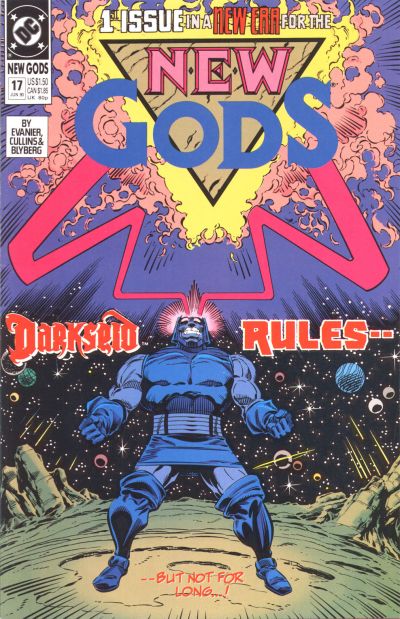It's always tricky when anyone other than the original creator touches such personal projects like the Fourth World. But that was Kirby's scheme from the beginning, to kick off books like New Gods and Mister Miracle and then hand them over to other talents under his guidance. Well, his guidance might be missing, but those characters have been done by a host of talents in the decades since Kirby was forced to step away from them.
After an epic story, we get a few single-issue efforts. In the first Orion seeks to track down and stop a serial killer named "The Poet". This story just goes to show how ineffective Orion can be in an operation requiring some element of stealth.
In a second Orion is forced to battle against a human being who gains the power of the ancient gods, if only for a short time. A man who thinks he's made for greater things can prove to be a great menace. Rick Hoberg steps in to take on the pencil chores in this issue.
We then are treated to another epic tale. In this one the menace of Darkseid is overshadowed by the return of the one god in whose shadow he will always live, his father Yuga Khan. Yuga Khan disappeared searching for the Souce but returns after uncounted years to take vengeance on those who killed his wife, before once again seeking the ultimate secret. His power is immense, far greater than Darkseid's and even the forces of New Genesis fall before his with little effort. He is a menace who we can only hope defeats himself. For his part Orion learns something about the nature of fathers and sons. I should also point out that this saga was a crossover of sorts with the revamped L.E.G.I.O.N. series of the time. We see only Lar Gand (better known as Mon-El) in the issues of the New Gods.
The twenty-second issue of the run is my favorite so far as it tells the story of Metron and how his longing for knowledge brought tragedy and death to New Genesis. Rick Hoberg is the artist and does a great job on his issue which features a rejuvenated Stepppenwolf. We also meet a woman who might have been Metron's love in a different universe.
Mark Evanier does a very clever job of telling a story of a gay man with AIDS in this tale which mentions neither homosexuality nor the loathsome disease. We meet a man who makes the ultimate sacrifice for others, others who reject him for what he is. In a story drawn by newcomer Steve Erwin we get a delicate but robust story which talks of things which regrettably were forbidden in many quarters in this time period.
The Forever People show up as guest-stars in a two-part tale that introduces us all to Maya, the latest addition to the clan and the daughter of Beautiful Dreamer and Big Bear. In Maya is the target of Desaad who wants to pressure the Forever People to doing what he wants. But they resist of course, and he sends deadly creatures from Apokolips to create havoc in the form of a nuclear disaster. It's all Orion can do to fend off the threats and the team calls upon the Infinity Man in their moment of desperation.
The next issue is a follow up to the previous two as Orion and Lightray attempt to track down some denizens of Apokolips seeking to escape. A young boy learns to to some extent the real meaning of death while an ancient god from the zombie-like "Dreggs" finds resurrection.
The series closes out with a two-part tale that features Lightray who seeks to bring back to life a young woman whose death seems especially pointless. His attempts to revive her bring danger to the world as a whole. By the story's end, the happy-go-lucky Lightray has a somewhat more sober attitude to life in general, though he is no less optimistic.
And that closes the book on this second New Gods revival. There were some really good stories in this run. The introduction of a new Forager and of Darkseid's father Yuga Khan in particular stand out. But the best creation is "The Dreggs". These shambling echoes of the old gods offer up a great deal of story potential and make perfect sense in the Fourth World as a whole. I was less taken with Evanier's concept of the "Anti-Life Equation" which seemed erratically explained and even at some points rejected. The ideal of free will was central to the themes of Kirby's Fourth World and making the Anti-Life equation something other than the simple ability to control others utterly seems to undermine his aims. But on the whole, these are better than I expected.
Rip Off


















No comments:
Post a Comment